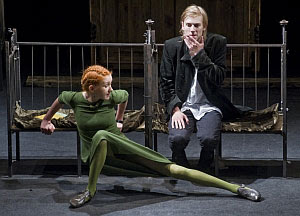Find myself having to go back to The Idiot, as my wife bought tickets for Nekrosius's production of the novel next month. There is an on-line version, but ordered the P&V translation, thinking I might get a fresher reading.
Eimuntas Nekrosius is Lithuania's foremost theater director, well known for his adaptations of Shakespeare and Chekhov. He burst on the scene back in the early 90s with a wonderful interpretation of Gogol's The Nose. He is regarded as one of the best directors in Europe and has been invited to Moscow and St. Petersburg on any number of occassions to stage his plays. His version of The Cherry Orchard featured a Russian cast and was very well received in Moscow.
Laimonas Briedis has a wonderful little story of Dostoevsky in Vilnius on his way to the spas of Germany in Vilnius: City of Strangers. Seems he was mostly worried about his luggage. Briedis culled his notes from Dostoevsky's wife's journal.

This looks incredible. I wish I could see Chekhov in Vilneus! I wish I could see Chekhov anywhere.
ReplyDeleteI'll be in DC in a couple weeks so will settle for Shakespeare.
I cringed at the idea of going to one of these plays at first because of the language barrier, but Nekrosius digs deep and I found language no barrier at all in terms of the physical dimension of his actors. He also likes to cross disciplines, bringing in Lithuanians prima ballerina to play the role of Desdemona in Otello. It was really something to watch. He has also staged Wagner's "The Ride of the Valkyries."
ReplyDeleteReally impressive repertoire, especially when you consider that his actors have to be able to play any one of several roles on short notice as he will do several of these plays in one year.
Once again the play has been postponed. Have to wait until February now to see the production. Meanwhile, I'm trying to get a hold of Bortko's 10-part series he did for Russian television.
ReplyDelete